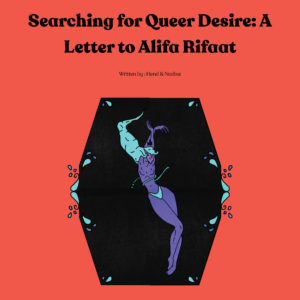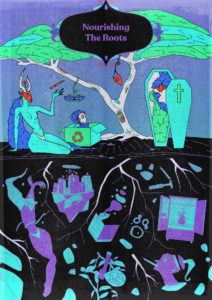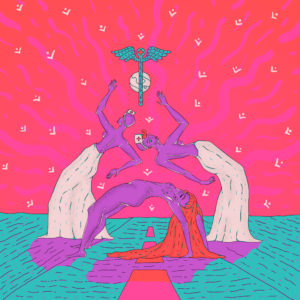Searching for Queer Desire PDF
Written by : Hend & Nadine.
Hend and Nadine are two Alexandrian queer women who translate, edit, and write for a living.
“There are many mysteries in life, unseen powers in the universe, worlds other than our own, hidden links and radiations that draw creatures together and whose effect is interacting. They may merge or be incompatible, and perhaps the day will come when science will find a method for connecting up these worlds in the same way as it has made it possible to voyage to other planets. Who knows?” 1
Dear Alifa/Fatimah, 2
I have been searching for you, for your story, piecing different narratives together. Sometimes I search with a sense of urgency, a scrambling even, as if my life depended on it. Other times, I search meticulously; picking apart the pages, the words, the stories. Almost as if I was searching for myself, looking for a semblance of meaning in an “unknown world.”
When I admitted to myself that I am in love with my bestfriend and she admitted it to me too, I found myself looking for our story everywhere: in other people’s stories, in novels, in movies. It was as if I was searching for a home, a haven, a safe place, a common shared history with women like us: women who love women.
I would search intently, read between the lines, as if I was rewriting other people’s stories in my head, I would grab at meanings, create something out of nothing.
A few years ago, my sister came home with a collection of used books that she bought. I was looking for something light to read. I found a thin book, a collection of short stories in English with the title “Distant View of the Minaret” written by you. To be honest, the cover and the blurb on the back of the book had an Orientalist tone that made my stomach turn. The translator’s foreword used words and phrases such as, “lifting the veil,” “traditional Muslim society,” and “special authenticity,” like an anthropologist of old, squinting through a magnifying glass held over non-white societities. That being said, I had a bit of free time on my hands, so I figured, “why not?”
And then in one of your stories, in what I thought was the most unlikely of places, I found a trace of a familiar desire: intense, passionate, in the shadows. The characters had Arabic names. The story unfolded in a house situated on the banks of the Mansoura Canal. The story happened in this country. Here. Home. Two women. Lusting, loving, exhaling pleasure. I saw bits of myself in both of them: the human, respectable wife of a government official, seen by society as one thing, feeling turmoil on the inside. And the other woman: snake, djinn, other. Sneaking in and out through a discreet hole in the wall. Disappearing right before she can be glimpsed by others. Imagined but tangible, breathable, real.
I am captivated by your main character’s world. Months fly by, but we are barely filled in on the background events. I am engrossed instead, as is your main character, in the love affair with the snake, who appears to her one sunny morning in the garden. I learn that she has children, but I’m not introduced to them. Her husband is only glimpsed in the background, the reason behind her relocation from Cairo to Mansoura. Sometimes he is a source of guilt. When she yearns to see the snake, guilt propels her to tell her husband about its existence, prompting him to board up the hole in the wall from whence the snake first emerged. You never give her or the snake proper names. They are only referred to as “beloved” by one another. Your protagonist slips in and out of these worlds: she spends half of the day furnishing her house and the other half consumed by her relationship with her beloved djinni snake.
I, too, like the snake, slipped in from one world to another. Between a world of invisibility and another of visibility. My body is nonexistent in one world, only there in physical form, performing societal duties and expectations. While in the other, I’m unravelling and becoming, exploring the contours of desire. You depict a sharp divide between the two worlds, whereas mine are always colliding, as I become more and more unable to perform invisibility. The remaining gap between the two worlds has become saturated with anger and bitterness. I think about the other day, sitting in the bathroom, crying, heart broken after having a heavy conversation on the phone with my girlfriend, my mama outside, humming, oblivious to my pain. I am struggling to be present, to pretend I am okay. I am tired, were you?
Were you torn between two worlds when you decided to adopt the pen name “Alifa”, in an attempt as I read, to spare your family the shame of being recognized as a woman who wrote about sexuality “unapologetically”? How did your two worlds meet and how did they diverge?
Some things seemed to come easy to you. Religion and desire coexisted in the same world. You depicted a love interwoven with holy verses from the Quran. The djinn snake, appearing in “beauty’s most perfect form,” the form of a woman, blessed Allah and in the same breath extolled the virtues of her lover. I was always told that faith and desire, especially queer desire, could not intermingle. They were destined to be on opposite sides of the boxing ring, locked in an endless, pugnacious struggle.To see your depiction of a “halal love,” one blessed by the almighty Himself, a love that did not shake the throne of Al-Rahman, that shook me to the core. To see sex as nourishment rather than sin, as holy, rather than evil, it was a revelation.
But part of me is greedy. Part of me wishes the djinn had taken on the form of a human woman with soft skin, warm lips, hungry eyes. Part of me wishes that she didn’t come from the “world of the unknown.” That she came instead from this tangible, messy reality. A woman you could touch, smell, taste. But I understand that maybe you were limited. Maybe this was the only way you could depict two women in love.
Maybe the metaphor extends beyond the body of the snake as the unknown. Maybe you were talking about your body. Growing up, my body felt unknown to me. Alien even. When I touched myself, it was always with a layer of clothing separating fingers from skin. And we both come from a society that doesn’t exactly encourage self-exploration. Did you feel the same way? Did you shrink the vast terrain of your body so that it wasn’t readily visible? Did you simultaneously marvel and recoil at the wetness between your legs, the arch of your hips, the roundness of your breasts? Maybe one of the women needed to be a snake, so she could guide the fingers of her mistress to every corner of her body, to slither down every bump on her skin, to teach her how to read and love herself. Maybe the snake is the woman, and the woman is the snake. Who knows? I wish you could tell me. I was never one for ambiguity. I’d make you a cup of shai bil laban, bring a packet of biscuits, and you could explain every intention and choice you made.
I yearned to read you in Arabic, imagined what it would have been like if I grew up having read your story and others like it, if you hadn’t been erased, censored. I looked for the original text, in bookstores, online, but everytime I asked, people would ask in confusion, “Who is Alifa Rifaat? Is she a new writer?” I discovered that you were well-known only in other countries. Your books often read in English, commissioned by publishing houses that favoured Orientalist tones. I felt like I lost something all over again. I learned of you, but couldn’t find you. I found scattered pieces of you here and there. An article that described your works as “controversial”, another about your life (or what’s known of it), who you married, when you were born, where you lived. What I wanted was a diary of your thoughts, ideas, and hopes, in your words, not mere lists of dates and names.
Who were you though? I spend my time making up stories, did you have a lover masked as a “best friend”, a story that was similar to mine. Did you lust, love, desire a woman. Did you wish for a different story, something beyond your immediate reality? Was that why, the only way you could imagine loving a woman, she had to be from a parallel reality, a world that is beyond your immediate everyday.
I continue to play this game of guessing and writing, and rewriting your story. I do the same with myself, erase and rewrite, torn between visibility and invisibility. A tug of war between worlds that are constructed by others, and the ones I create for myself.
When I was young, I imagined that there was a box inside of me that I needed to fill. In trying to figure out who I was, I hunted for things here and there, little things I related to. I was trying to create an archive that would help me understand the world. I tried to fill it with stories that I can touch and see and smell. Stories that I can breathe in with familiarity. I tried to fill it with neat stories, those that fit together, that were consistent, but in the end, it was filled with contradictions and messiness.
I am left with this text though, a translation of a story you wrote in the same language that I grew up in, a reminder of what was translated and erased.
I wonder where you are now. I hope it’s a world without pseudonyms, fear, or guilt. A world that is more familiar than unknown.
Much love and peace to you,
A reader



